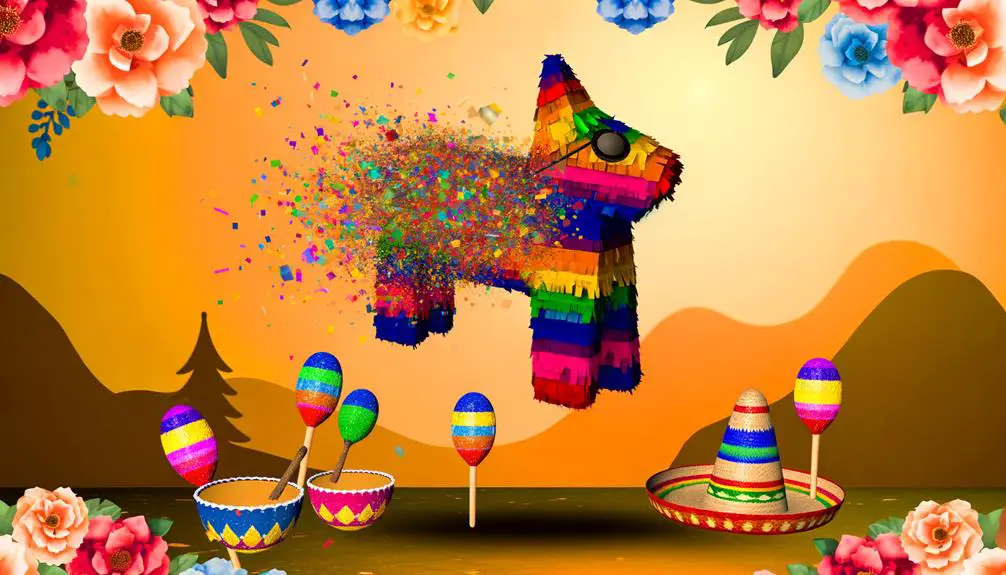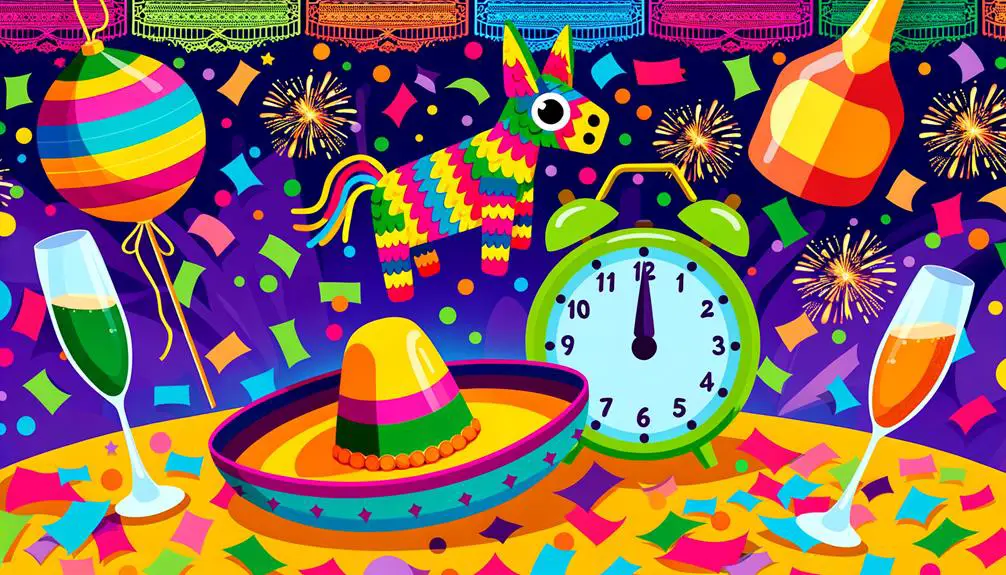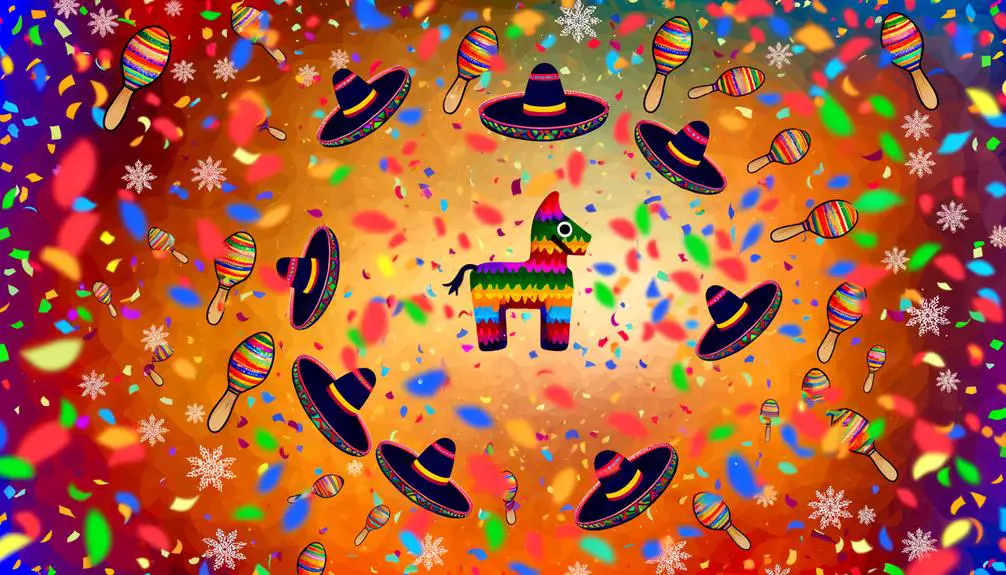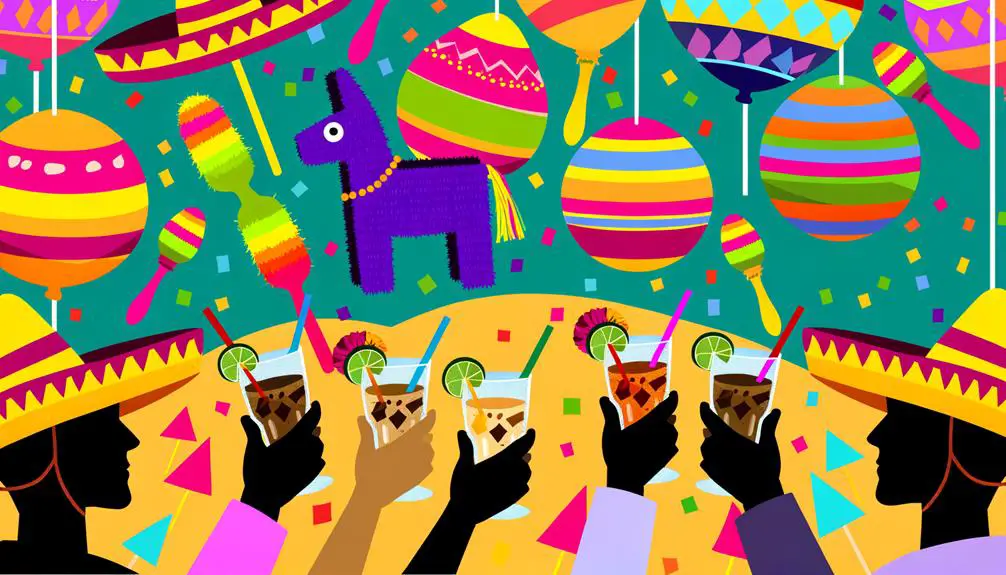As you immerse yourself in the festive spirit of Spain, you'll want to know the authentic phrases and traditions that make this time of year so special. Start with essential holiday greetings like '¡Que te traiga muchos regalos!' (May it bring you many gifts!) and '¡Feliz ambiente!' (Happy atmosphere!). Then, explore regional traditions like Navidad markets, processions, and posadas routes. Want to sound like a local? Try using colloquial expressions like '¡Buen rollito!' (Good roll!) and '¡Qué tiempos!' (What times!). Continue exploring, and you'll uncover the secrets to making your Spanish holiday season an unforgettable one.
Essential Holiday Phrases

What phrases will you need to know to immerse yourself in the festive season like a native Spanish speaker? As you explore the holiday season, you'll want to familiarize yourself with essential phrases that'll help you connect with locals and fully engage in the festive atmosphere.
In Spain, winter traditions and holiday superstitions are an integral part of the season. You'll often hear '¡Feliz Navidad!' (Merry Christmas!) or '¡Próspero Año Nuevo!' (Happy New Year!).
But did you know that in some regions, it's believed that eating 12 grapes at midnight on New Year's Eve will bring good luck? Or that in others, it's customary to wear new, yellow underwear on December 31st for good fortune?
To blend in like a local, learn phrases like '¡Buen provecho!' (Enjoy your meal!) when sharing festive feasts with friends and family. You can also impress with '¡Que pases un feliz Navidad!' (Have a Merry Christmas!) or '¡Que tengas un próspero Año Nuevo!' (Wishing you a Happy New Year!).
With these essential phrases under your belt, you'll be well-equipped to immerse yourself in the festive season like a native Spanish speaker.
Colloquial Christmas Greetings
As you mingle with locals during the holiday season, you'll hear colloquial Christmas greetings that go beyond the standard '¡Feliz Navidad!' When Spaniards want to wish someone a Merry Christmas, they often use more casual and informal expressions that reflect the festive atmosphere.
You might hear '¡Que te traiga muchos regalos!' (May it bring you many gifts!) or '¡Que tengas una Navidad llena de amor y alegría!' (May you have a Christmas filled with love and joy!).
In Spain, the holiday season is all about spreading joy and good vibes, so you'll often hear '¡Feliz ambiente!' (Happy atmosphere!) or '¡Buen rollito!' (Good roll!), which roughly translates to 'good vibes' or 'good times.'
To get into the Navidad vibes, try using phrases like '¡Que la Navidad te traiga paz y amor!' (May Christmas bring you peace and love!) or '¡Espero que tengas una Navidad inolvidable!' (I hope you have an unforgettable Christmas!).
New Year's Eve Expressions

On New Year's Eve, you'll hear Spaniards wishing each other '¡Feliz Año!' (Happy New Year!) or '¡Próspero Año Nuevo!' (A prosperous New Year!), but there are many more colloquial expressions to discover.
As you count down to midnight, you might hear '¡Qué tiempos!' (What times!) or '¡Hasta el próximo!' (Until the next one!).
When the clock strikes twelve, it's time for the traditional Midnight Toast, where friends and family gather to share a glass of cava or champagne and exchange well-wishes. You might even receive some party favors, like hats, noisemakers, or confetti, to add to the festive atmosphere.
If you're feeling adventurous, you could try using some colloquial expressions like '¡La cuenta atrás!' (The countdown!) or '¡Ya casi!' (Almost there!).
Whatever you choose, you'll be sure to fit right in with the Spaniards as they welcome the new year with open arms.
\
\¡Salud!
Regional Festive Traditions
You'll find that each region in Spain has its own unique festive traditions, shaped by its distinct cultural heritage and history. As you explore the country, you'll discover that each region puts its own twist on the holiday season.
In the north, you'll find the charming Navidad markets in cities like Bilbao and San Sebastián, where you can sample local delicacies and shop for handmade gifts.
In the south, the festive atmosphere is electric, with processions and parades filling the streets. In Andalusia, you can follow the Posadas routes, a reenactment of the journey of Mary and Joseph, which is a beloved tradition in many towns.
Meanwhile, in Catalonia, you'll find a unique blend of Catalan and Spanish traditions, with festivities centered around the Tió de Nadal, a festive log that 'poops' out presents.
Whatever region you're in, you'll find that the Spanish know how to throw a fiesta, and you're sure to have a memorable holiday experience. So, get ready to immerse yourself in the rich cultural heritage of Spain's festive traditions!
Common Holiday Wishes

When exchanging gifts and greetings with Spanish friends and family, understanding the common holiday wishes is essential to help you connect with the locals and show respect for their culture. You'll want to know how to express your festive sentiments like a native.
Start with 'Feliz Navidad' (Merry Christmas) or 'Próspero Año Nuevo' (Happy New Year). For a more casual tone, try 'Que tengas un buen fin de año' (Have a great end of the year).
To make your holiday wishes more personal, share a cherished Holiday Memory, like 'Espero que este año sea tan especial como el último' (I hope this year is as special as the last).
When it comes to Gift Etiquette, remember that in Spain, gifts are typically exchanged on January 6th, Three Kings' Day. Don't forget to include a thoughtful note with your gift, expressing your appreciation for the person and the holiday season.
Seasonal Small Talk
As you mingle with Spanish friends and family during the holiday season, you'll naturally find yourself chatting about the festivities, and knowing how to engage in seasonal small talk will help you build connections and show interest in their traditions.
When participating in winter conversations, remember that holiday etiquette is key. Start by asking about their plans for the holidays, '¿Qué planes tienes para Navidad?' (What are your plans for Christmas?). You can also ask about their favorite traditions, '¿Cuál es tu tradición favorita en Navidad?' (What's your favorite Christmas tradition?).
Show genuine interest in their responses and share your own experiences. You can say, 'Me encanta la comida navideña, especialmente el turrón' (I love Christmas food, especially nougat).
Authentic Ways to Say Cheers

In Spain, saying 'Cheers!' is more than just a casual toast – it's an integral part of the festive atmosphere, and mastering authentic phrases will make you sound like a native.
When you're sipping on a cold cerveza or enjoying Tapas toasts with friends, you'll want to raise your glass with confidence. Instead of just saying 'Salud!' (cheers), try using fiesta phrases like '¡Chinchín!' or '¡Salud, amigos!' to add a touch of flair to your toast.
If you're feeling fancy, you can even say '¡Por la vida!' (to life!) or '¡Por la felicidad!' (to happiness!). Remember, the key to pulling off authentic Spanish toasts is to be loud, proud, and enthusiastic – after all, you're celebrating with friends and family!
Frequently Asked Questions
Can You Use "Feliz" for Both "Happy" and "Lucky" in Spanish?
Imagine you're at a Spanish fiesta and someone tells you, '¡Feliz cumpleaños!' (Happy Birthday!).
You might wonder, can you use 'feliz' for both 'happy' and 'lucky' in Spanish?
The answer is yes! 'Feliz' can convey emotions like joy, but it's also used in lucky expressions like 'félix' (lucky) or 'feliz coincidencia' (happy coincidence).
Are There Any Holiday-Specific Dialects in Different Spanish Regions?
You're curious about holiday-specific dialects in different Spanish regions. Well, you'll find Regional Twists and Dialectal Variations that'll make your festive greetings sound like a native's.
In Spain, Catalans wish 'Bon Nadal' while Andalusians say 'Felices Fiestas'.
In Latin America, Mexicans exclaim '¡Feliz Navidad!' while Colombians say 'Felices Vacaciones'.
Each region has its unique flavor, so get ready to spice up your holiday greetings!
How Do You Pronounce "Navidad" and Other Spanish Holiday Words?
Imagine sipping hot cocoa by a crackling fire, surrounded by festive decorations – it's the perfect setting to learn how to pronounce Spanish holiday words! You'll want to get it right, so listen up!
When pronouncing 'navidad' (Christmas), remember the accent mark on the 'i' indicates Syllable Stress on the second syllable: na-vi-DAD. Similarly, 'Feliz Navidad' is fe-LIZ na-vi-DAD.
Practice makes perfect, so go ahead and give it a try!
What's the Difference Between "Noche Buena" and "Noche Vieja"?
You're wondering about the difference between 'noche buena' and 'noche vieja'? Well, let's break it down!
'Noche buena' refers to Christmas Eve, a special night filled with family gatherings, delicious food, and joyful traditions.
On the other hand, 'noche vieja' means New Year's Eve, a time for reflection, setting New Year's resolutions, and celebrating the start of a fresh year.
Are There Spanish Holiday Phrases for Non-Christian Celebrations?
Imagine a vibrant tapestry of cultures, woven with diverse threads of celebration.
You're wondering if Spanish has phrases for non-Christian holidays. The answer is sí!
For Diwali, you can say 'Feliz Diwali' or 'Shubh Diwali.' For Hanukkah, try 'Feliz Janucá' or 'Hanukkah sameach.'
You'll find warm welcomes in Spanish-speaking communities, embracing the beauty of diverse traditions.







